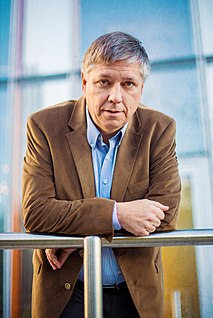
Guy Maurice Marie Louise Verhofstadt is a Belgian politician who has served as the Leader of the Alliance of Liberals and Democrats for Europe and a Member of the European Parliament (MEP) from Belgium since 2009. He served as the 47th Prime Minister of Belgium from 1999 to 2008, Deputy Prime Minister of Belgium from 1985 to 1992 and Minister of Budget from 1985 to 1992. He was a Member of the Chamber of Representatives from 1985 to 2009.

The country of Belgium is divided into three regions. Two of these regions, the Flemish Region or Flanders, and Walloon Region, or Wallonia, are each subdivided into five provinces. The third region, the Brussels-Capital Region, is not divided into provinces, as it was originally only a small part of a province itself.

Christian Democratic and Flemish is a Christian democratic Flemish political party in Belgium. The party has historical ties to both trade unionism (ACV) and trade associations (UNIZO) and the Farmer's League. Until 2001, the party was named the Christian People's Party.

The 18 May 2003 Belgian federal elections were the first Belgian elections to be held under a new electoral code. One of the novelties was an electoral threshold of 5%, which has cost many seats to the N-VA and the Green parties, Ecolo and Agalev. The Belgian Socialists recovered well; the liberal and nationalist parties increased their vote as well.

Belgium is a federal state with a multi-party political system, with numerous parties who factually have no chance of gaining power alone, and therefore must work with each other to form coalition governments.
On 13 June 2004, regional elections were held in Belgium, to choose representatives in the regional councils of the Flemish Parliament, the Walloon Parliament, the Brussels Parliament and the German-speaking Community of Belgium. The elections were held on the same day as the European elections.

The Parliament of the Walloon Region, which brands itself as the Parliament of Wallonia and previously as the Walloon Parliament, is the legislative body of the Walloon Region (Wallonia), one of the three self-governing regions of Belgium. The parliament building, the former Hospice Saint-Gilles, is situated in Namur, the capital of Wallonia, at the symbolic confluence of the Meuse and the Sambre, the two main rivers of the most inhabited parts of Wallonia, the Sillon industriel. On the other side of the Meuse, facing the Parliament, is the Élysette, the seat of the Walloon government.
Regional elections were held in Belgium, to choose representatives in the regional councils of Flanders, Wallonia, Brussels and the German-speaking Community on 13 June 1999. The regional elections were held on the same day as the European elections and the federal elections.

Flanders is both a cultural community and an economic region within the Belgian state, and has significant autonomy.

Flemish political parties operate in the whole Flemish Community, which covers the unilingual Flemish Region and the bilingual Brussels-Capital Region. In the latter, they compete with French-speaking parties that all also operate in Wallonia. There are very few parties that operate on a national level in Belgium. Flanders generally tends to vote for right-wing, conservative parties, whereas in French-speaking Belgium the socialist party is usually the most successful one.

Elections in Belgium are organised for legislative bodies only, and not for executive functions. Direct elections take place for the European Parliament, the bicameral Federal Parliament, the Parliaments of the Communities and Regions, the provincial councils, the municipal councils and a few district councils. Voting is mandatory and all elections use proportional representation which in general requires coalition governments.

The June 13, 1999 Belgian federal elections was a Belgian election for the Belgian Chamber of Representatives and Belgian Senate. The federal general elections were held on the same day as the European elections and the regional elections. The Flemish Liberals and Democrats (VLD) became the largest party.

The 21 May 1995 Belgian general elections was a Belgian election for the Chamber of Representatives and Senate. The Christian People's Party (CVP) kept its position as largest party in Flanders and overall in Belgium, and Jean-Luc Dehaene (CVP) continued as Prime Minister.

Johan Maria Gerardus Vandeurzen is a Belgian politician, member of Christen-Democratisch en Vlaams (CD&V), a centrist Flemish Christian Democratic party.

Elections to the Swiss Federal Assembly, the federal parliament of Switzerland, were held on Sunday, 21 October 2007. In a few cantons, a second round of the elections to the Council of States was held on 11 November, 18 November, and 25 November 2007. For the 48th legislative term of the federal parliament (2007–2011), voters in 26 cantons elected all 200 members of the National Council as well as 43 out of 46 members of the Council of States. The other three members of the Council of States for that term of service were elected at an earlier date.

The 13 December 1987 Belgian general elections was a Belgian election for the Belgian Chamber of Representatives and Belgian Senate. Elections to the nine provincial councils were also held.
On October 28, 1990, regional elections were held in the German-speaking Community of Belgium, to choose representatives for the Council of the German-speaking Community. Elections for the Flemish Council and the Walloon Council were not held until 1995.
Regional elections were held in Belgium on 7 June 2009 to choose representatives in the regional parliaments of Flanders, Wallonia, Brussels and the German-speaking Community of Belgium. These elections were held on the same day as the European elections.
A regional election was held in Belgium on 18 June 1989 to elect representatives to the first Brussels Regional Council, which replaced the Brussels Agglomeration Council as a result of the creation of the Brussels-Capital Region. Elections to the European Parliament were held on the same day.















